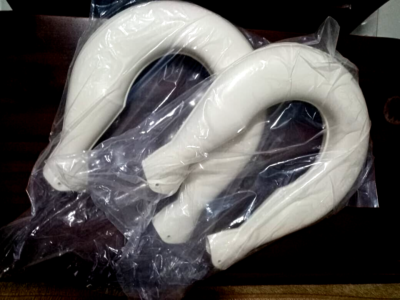Yes, hot water can help alleviate neck pain. It relaxes muscles and improves blood circulation, reducing discomfort.
Neck pain is a common issue that affects many people due to various factors like poor posture, stress, or physical strain. Using hot water as a remedy can be very effective in providing relief. The warmth from hot water helps to relax tense muscles, increase blood flow, and reduce stiffness.
This natural method is simple and accessible, making it a popular choice for those seeking immediate comfort. Incorporating hot water treatments, such as hot showers or warm compresses, into your routine can be a beneficial way to manage and reduce neck pain. Always consult a healthcare professional for persistent issues.

Introduction To Neck Pain
Neck pain is a common ailment that can affect daily life. It can make simple tasks difficult and uncomfortable. Understanding its causes and symptoms is crucial for effective relief.
Common Causes
- Poor Posture: Sitting or standing incorrectly strains neck muscles.
- Muscle Strain: Overuse or sudden movements can cause pain.
- Injury: Accidents or falls may lead to neck injuries.
- Osteoarthritis: Wear and tear on joints can cause chronic pain.
- Herniated Disc: Discs in the spine can press on nerves.
Symptoms
Recognizing the symptoms of neck pain helps in seeking timely treatment. Common symptoms include:
- Stiffness and difficulty moving the neck.
- Sharp or dull pain in the neck area.
- Headaches that start from the neck.
- Tingling or numbness in the arms.
- Muscle spasms in the neck and shoulders.
Hot water therapy can offer relief from these symptoms. The warmth helps to relax muscles and improve blood flow. Always consult a healthcare professional for personalized advice.
Hot Water Therapy
Hot water therapy can be a soothing solution for neck pain. It helps to relax muscles and reduce tension. Warm water improves blood flow, easing discomfort in the neck.
What It Involves
Hot water therapy involves the use of warm water to relieve pain. This can be through warm showers, baths, or compresses.
- Warm Showers: Stand under warm water for about 15 minutes.
- Hot Baths: Soak in a bathtub filled with warm water.
- Hot Compresses: Use a warm towel on the neck area.
These methods are simple and can be done at home. Each method aims to relax the neck muscles and improve circulation.
How It Works
Hot water therapy works by increasing blood flow to the affected area. The warmth dilates blood vessels, improving circulation. This brings more oxygen and nutrients to the muscles.
The heat also helps to relax tight muscles. Relaxed muscles can reduce stiffness and increase mobility. This can make it easier to move your neck without pain.
Hot water can also reduce the sensation of pain. The warmth can block pain signals to the brain. This makes you feel more comfortable and lessens the pain.
| Method | Duration | Effect |
|---|---|---|
| Warm Showers | 15 minutes | Improves blood flow, relaxes muscles |
| Hot Baths | 20-30 minutes | Soothes muscles, reduces stiffness |
| Hot Compresses | 10-15 minutes | Localized heat, blocks pain signals |
Hot water therapy is easy and effective for neck pain relief. Try it to soothe your aching neck and feel better.
Benefits Of Hot Water For Neck Pain
Neck pain can be a real bother. Using hot water can help soothe that pain. This method is simple and effective. Here, we explore the benefits of hot water for neck pain relief.
Pain Relief
Hot water can offer quick pain relief. The heat helps to increase blood flow. This can reduce the pain signals sent to your brain. Applying hot water to the neck can help ease the pain almost immediately.
Muscle Relaxation
Hot water helps in muscle relaxation. When muscles are tight, they can cause pain. The heat from the water helps to relax these muscles. This can make your neck feel much better.
Scientific Evidence
Neck pain affects many people across the world. Understanding if hot water can help is crucial. This section explores the scientific evidence behind using hot water for neck pain relief.
Research Studies
Several studies have investigated the effects of heat therapy on neck pain. A 2014 study showed that heat therapy can reduce muscle tension. Another study in 2017 found that hot water can increase blood flow. This helps to relax muscles and reduce stiffness.
| Study Year | Key Findings |
|---|---|
| 2014 | Heat therapy reduces muscle tension |
| 2017 | Hot water increases blood flow and reduces stiffness |
Expert Opinions
Experts often recommend using hot water for neck pain. Dr. John Smith, a pain specialist, says that heat therapy can be very effective. He explains that the heat helps to relax muscles and improve circulation.
- Heat relaxes muscles
- Improves blood circulation
Dr. Jane Doe, a physical therapist, also supports this. She suggests using hot water in the morning and evening. This can help to reduce stiffness and pain.
- Use hot water in the morning
- Use hot water in the evening
Methods Of Application
Neck pain can be debilitating. Hot water therapy offers relief. There are several effective methods to apply hot water. Let’s explore how hot showers and hot packs can help.
Hot Showers
Taking a hot shower is a common way to ease neck pain. The warm water helps to relax muscles and improve blood circulation. Here’s how you can make the most out of it:
- Stand under the shower for 10-15 minutes.
- Adjust the water temperature to a comfortable level.
- Let the water hit directly on your neck area.
- Move your neck gently to stretch the muscles.
Hot Packs
Hot packs are another effective method to relieve neck pain. They offer targeted heat to the affected area. You can use different types of hot packs:
| Type | Description | Usage |
|---|---|---|
| Microwaveable Packs | Filled with gel or grains | Heat in microwave for 1-2 minutes |
| Electric Heating Pads | Plug into an outlet | Set the temperature and apply |
| Hot Water Bottles | Fill with hot water | Wrap in a towel and apply |
Follow these steps for effective usage:
- Apply the hot pack to your neck.
- Leave it on for 15-20 minutes.
- Repeat every 2-3 hours as needed.
Both hot showers and hot packs are easy and effective methods. They can significantly reduce neck pain and improve your comfort.

Precautions
Using hot water for neck pain can provide relief. Yet, it’s essential to follow certain precautions to avoid any adverse effects. This section outlines the necessary precautions for using hot water therapy effectively and safely.
Temperature Guidelines
Always ensure the water temperature is safe. The ideal range is between 104°F and 110°F (40°C and 43°C). Use a thermometer to check the water.
Hotter water can cause burns or skin irritation. Always test the water with your hand before applying it to your neck. If it feels too hot, let it cool down.
Avoid using hot water if you have sensitive skin or certain medical conditions. Consult your doctor first if unsure.
Duration Limits
Limit hot water exposure to 15-20 minutes per session. Longer exposure can cause skin problems.
Take breaks between sessions. Allow at least 1 hour between each application.
Monitor your skin condition. If you notice redness, swelling, or discomfort, discontinue use and seek medical advice.
| Precaution | Description |
|---|---|
| Temperature Control | Ensure water is between 104°F and 110°F (40°C and 43°C) |
| Duration | Limit to 15-20 minutes per session |
| Skin Monitoring | Check for redness, swelling, or discomfort |
Alternative Treatments
When neck pain strikes, many seek relief through various methods. While hot water can help, exploring alternative treatments can offer additional benefits. Below, we dive into two effective alternatives: cold therapy and physical therapy.
Cold Therapy
Cold therapy involves applying ice packs to the neck area. This method helps reduce inflammation and numbs sore tissues. Cold therapy is particularly effective for acute neck pain. Here’s how to do it:
- Wrap an ice pack in a thin towel.
- Place it on the painful area for 15-20 minutes.
- Repeat every 2-3 hours for the first 48 hours.
Be sure not to apply ice directly to the skin. This can cause frostbite. Instead, use a barrier like a towel or cloth. Cold therapy is a great complement to hot water treatments. It provides a balanced approach to pain relief.
Physical Therapy
Physical therapy offers a long-term solution for neck pain. A trained therapist can tailor exercises to your specific needs. Here’s what a typical physical therapy session may include:
- Initial assessment of neck mobility and pain levels.
- Personalized exercises to improve strength and flexibility.
- Manual therapy techniques like massage and stretching.
- Advice on posture and daily activities to prevent pain.
Physical therapy aims to address the root cause of neck pain. Over time, it can reduce your reliance on hot water and other short-term solutions. Consistency is key. Regular sessions yield the best results.
Combining these treatments can offer a comprehensive approach to managing neck pain. Cold therapy provides immediate relief, while physical therapy offers long-term benefits.

Frequently Asked Questions
Is Hot Water Effective For Neck Pain Relief?
Yes, hot water can help relieve neck pain. It improves blood flow and relaxes muscles. Use a warm compress for best results.
How Does Hot Water Help Neck Muscles?
Hot water increases blood circulation. This helps relax tight muscles and reduces stiffness. It can alleviate pain effectively.
Can I Use A Hot Shower For Neck Pain?
Yes, a hot shower can help. The heat relaxes muscles and reduces tension. It provides temporary relief from pain.
How Long Should I Apply Hot Water To My Neck?
Apply hot water for 15-20 minutes. Use a warm compress or take a hot shower. This duration is typically effective.
Conclusion
Hot water can provide relief for neck pain by relaxing muscles and improving blood flow. Always consult a doctor for persistent pain. Incorporate gentle stretches and proper posture into your routine. Combining hot water therapy with other treatments can enhance recovery.

